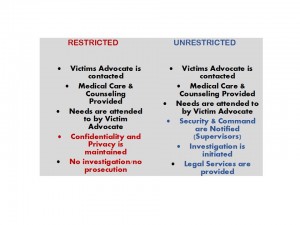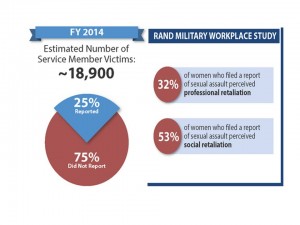Sexual Assault: it is a topic that some of us are passionate to discuss and others avoid due its uneasy nature, nevertheless, sexual assault is a topic that no one can deny the existence and severity. While sexual assault has been a hot topic for the military and Department of Defense, one issue that continues to be a confusing controversy is the military reporting method of a sexual assault.
The injuries from a sexual assault can spread over a lifespan and to family and friends yet victims continue to struggle with reporting sexual assaults within the military. The DoD’s Sexual Assault Prevention and Response Office Annual Report in the Military (2014) is a call to action for military leaders and policy makers to improve the reporting methods that will promote sexual assault reports by establishing a sense of confidentiality and safety for the victim.
The Facts: Restricted vs Unrestricted Reporting Procedures
Sexual Assault is defined as sexual contact or behavior that occurs without consent, to include forced intercourse, sodomy, child molestation, incest, attempted rape, and fondling (Department of Justice, 2015). The key word here is “CONSENT.” The military views incapacitation (ie: drunk), unconsciousness, verbal/non-verbal resistance, and a lack of resistance as “NO CONSENT” (DoD Directive 6495.01, 2015).
Restricted Reporting intends to maintain the confidentiality and privacy of the victim to ensure that medical and mental services are available without notifying supervision or police. The victim receives the same resources and treatment, but there is no investigation for the crime, leaving the assailant unpunished.
Unrestricted Reporting provides the same medical and mental services as restricted reporting, however chain of command (ie: supervisors) and security are notified of the crime and an investigation is started. In addition to the medical and mental health services, the victim receives legal support.
Sexual Assault & Military Culture
While the policies and rules behind sexual assault and reporting methods seem clear and concise, things begin to become unclear and complicated when integrated into military culture.
The military believes in camaraderie and loyalty. Some individuals are required to spend 24 hours together in enclosed locations. However, 81% of unrestricted reports identify the perpetrator as a military member. Often times, these are between coworkers or supervisor/subordinate.
Sexual assault within the work environment disrupts trust (which is essential for military) and not only affects the victim, but the entire team. Out of 18,900 estimated assaults for the year 2014, only ¼ were reported. Many victims have a fear of professional and social retaliation, especially with an unrestricted report.
The Dilemma
How can a victim ensure his or her own safety from the perpetrator, often times a coworker or supervisor, while also keeping their privacy and confidentiality on such a sensitive issue? If a victim files an unrestricted report they can maintain confidentiality, but must endure being near the perpetrator. If the men and women in arms are struggling to find trust within each other, how can we trust them to protect our nation?
A Call to Action
The Department of Defense has made great strides in attacking the issues of sexual assault. Prevalence of sexual assault has decreased from 2012 while reporting has increased. Additionally, legal councils and victim advocate teams train extensively to handle such sensitive situations. (Reports to President on SAPR, 2014). However, these improvements fail to address the barriers that victims face when attempting to report a sexual assault. In order to encourage reports of sexual assault, policy makers and military leaders are called to:
- Allow victims to pursue legal action while maintaining privacy and confidentiality.
- Allow victims the opportunity to report a sexual assault outside of the military.
- Allow volunteering victims to act as Victim Advocates for individuals who are considering a sexual assault report
- Educate troops and commanders about victims’ negative perceptions of retaliation to deter victims’ fears
Changes and support for these initiatives will help combat sexual assault within the military; provide victims with an avenue of advocacy and support; and ultimately secure the nation’s well-being on the military front.